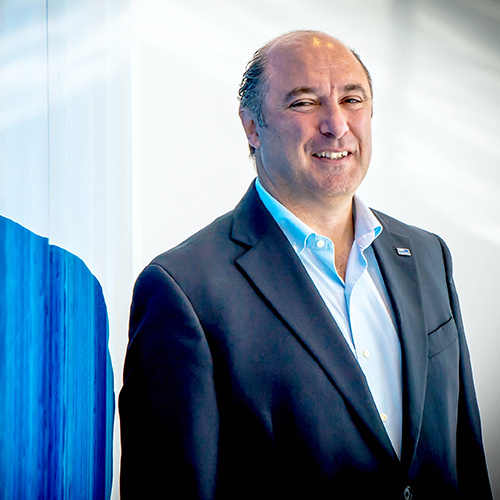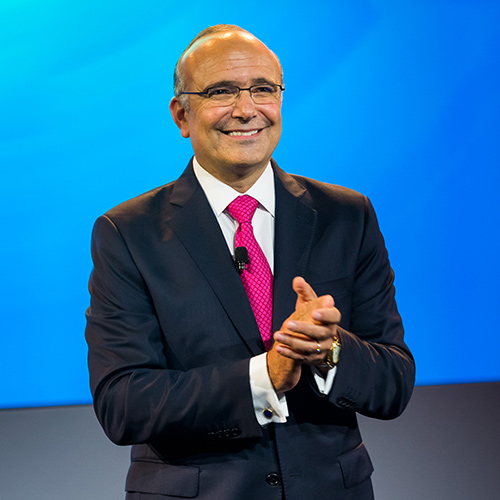As a child growing up in Mexico City, Jorge Barroso was unaware of an entire world outside his home country. “It was my whole universe,” he says. But when he turned 10, everything changed.
Barroso’s father took a career opportunity that brought the entire family to New York City for one year. Barroso voraciously learned English, went to an American school, and made new friends with different backgrounds. The next year his family moved back to Mexico, but Barroso was forever changed.
As he continued his schooling in Mexico, Barroso made sure to keep up his English, and his family would travel occasionally to the US for vacations. Barroso studied cybernetic engineering in college. It wasn’t until he started his professional career that Barroso reaped the benefits of fluently speaking a second language and understanding a different culture.
In 1992, Barroso worked as an IT manager at Dell, then a computer startup opening operations in Mexico. It was the start of a highly international 15-year tenure with Dell—starting with travel throughout the US, Japan, Australia, Malaysia, and the European Union just in the first two years.
At the end of 1996, Barroso was offered the opportunity to lead IT at Dell for all of Latin America. “Finally, I was using my bilingual abilities to make the bridge between cultures,” he says. During the next eight years, Barroso worked all over Latin America, opening and managing the day-to-day IT Operations for Chile, Colombia, Brazil, Argentina, Panama, and El Salvador.
Extending the bridge much further, in 2006, Barroso was managing global IT operations for the Dell call centers in India and had developed a truly thorough understanding of a wide range of global cultures and business operations.
Barroso then moved on from Dell and entered the education sector. In 2007, he joined Laureate Education as vice president for IT international. He had the opportunity to visit a total of 13 different universities located in Chile, Brazil, Costa Rica, Panama, Mexico, Malaysia, and Spain.
In 2012, Barroso came into his current post as chief information officer of the Council on International Educational Exchange (CIEE). In this role, Barroso works to emphasize the importance of having multicultural understanding and global sensitivity to students. CIEE is a nonprofit, non-governmental organization founded after World War II as a way to bring cultures together through sharing and education. Through CIEE, high school and college students can go live in other countries, with host families—a two-way street to increase understanding among cultures.
In his role at CIEE, Barroso is harnessing the power of technology to help students continue their chosen courses of study while abroad and share their experiences with students and their families back home. “I was looking for a company with a vision I admired, where I could make a difference. CIEE gave me that opportunity,” he says.
Barroso was initially surprised to see how technologically behind the education industry was, and he made it his mission to bring CIEE up-to-date. He brought a focus to the way the company uses technology, how it operates professionally in its space, and its strategy for the future. By keeping his priority on the big picture, he was able to create a three-to-five-year strategic plan for CIEE to become an institution taking advantage of cutting-edge of technology usage for educational purposes. “The day-to-day is secondary,” he says.
Some changes are internal, like updating the organization’s help desk to a better service management system or moving the financial management system to the cloud, making the work easier for 600 employees stretched across 42 countries. “These changes prevent business from getting in the way of actual work for the organization,” he says. “Things that before were taking 20 minutes, now take 10. People are more efficient and have more time to do other things.”
Other changes have been external, like the recent implementation of Canvas: a new online learning management tool that allows students to keep up with their homework from anywhere in the world. “Students are offered the international cultural experience, but at the same time they have to be studying,” Barroso says. “We are using the best, most cutting-edge technology to facilitate that mobility.”
The next goal on Barroso’s list is to make it easier to support communication and shared experiences so that students can more easily relay their learnings with friends and loved ones back home. The more connectivity updates that are implemented, the easier it gets to do just that.
“Technology is connection,” he says.
Barroso, who is now based in Austin, Texas, still travels constantly to places where CIEE has a growing presence, such as Berlin, Dubai, and Amman, Jordan. He loves being part of an organization opening cultural doors to the next generation.
“Having the experience to study in a different place changes your life,” Barroso says. “Until you live it you don’t understand it, but that’s what we do here.”

